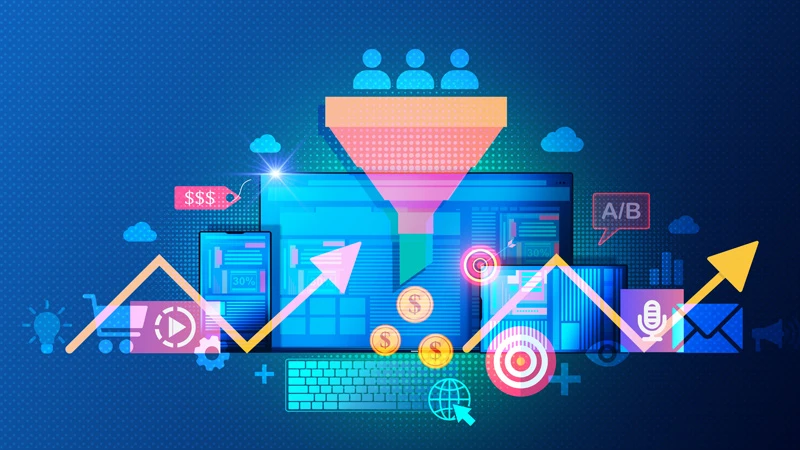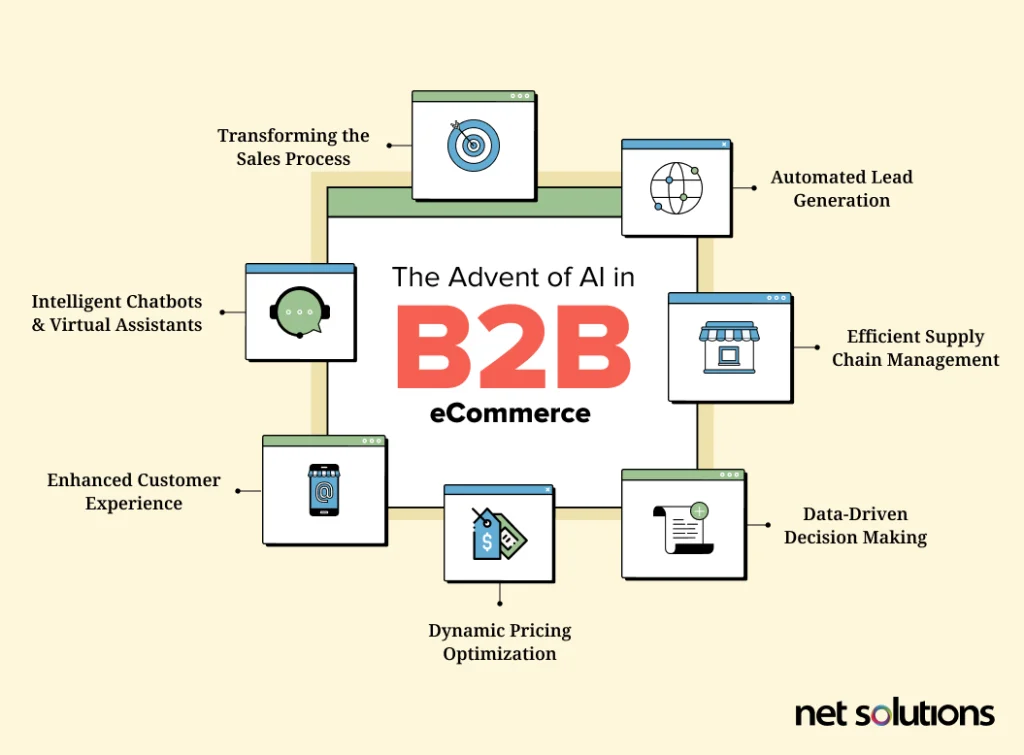How Growth Systems For B2B improves strategic planning and decision-making
Wiki Article
The Future of B2B: Using AI Automation to Drive Success
The landscape of B2B is moving as firms progressively turn to AI automation for calculated advantage. This makeover guarantees to boost effectiveness and customer interaction through innovative technologies. The integration of these tools is not without its obstacles. Understanding exactly how businesses can browse this evolving terrain will certainly be vital for future success. What factors will establish the effectiveness of AI in this market? The answers may redefine typical company designs.Understanding AI Automation in B2B
As organizations significantly seek effectiveness, recognizing AI automation in B2B becomes necessary. AI automation refers to using fabricated intelligence technologies to enhance and enhance business processes. In the B2B market, this entails the integration of AI tools to take care of jobs such as information analysis, consumer communications, and supply chain procedures. By leveraging artificial intelligence and natural language handling, business can boost accuracy, decrease human error, and accelerate decision-making (Business Process Automation). AI automation promotes the handling of large volumes of data, allowing organizations to remove valuable insights and optimize their operations. As companies navigate this technological landscape, an extensive grip of AI automation's capacities will certainly encourage them to remain receptive and competitive to market needsSecret Advantages of AI Automation for Services
While several organizations face raising functional demands, AI automation provides various benefits that can significantly improve their performance. One significant advantage is efficiency; AI systems can perform repetitive jobs faster and with better precision than people, therefore freeing and minimizing errors up staff members for more critical campaigns. In addition, AI automation makes it possible for data-driven decision-making by assessing huge datasets swiftly, offering insights that educate service techniques. Cost decrease is one more essential benefit, as automation minimizes labor prices and enhances resource appropriation. AI can improve scalability, allowing organizations to adapt to market changes quickly. Ultimately, the assimilation of AI automation promotes innovation, allowing firms to stay affordable in a quickly evolving landscape.Transforming Consumer Experiences With AI
AI is reshaping consumer experiences by allowing personalized interactions and enhancing involvement. Through the application of predictive analytics, services can expect customer requirements and choices, leading to a lot more customized services. Furthermore, simplifying support processes with AI technology enhances performance and complete satisfaction, eventually changing the overall client trip.Individualized Interactions and Engagement
Customized interactions have come to be a foundation of effective consumer engagement in the B2B landscape. By leveraging AI-driven services, organizations can tailor their interaction and offerings to fulfill the one-of-a-kind demands of each customer. Automated systems assess consumer actions, choices, and information, enabling organizations to create customized experiences that resonate with their audience. This level of personalization not only enhances consumer fulfillment however likewise promotes long-lasting loyalty. Furthermore, AI tools help with real-time interactions, allowing businesses to respond without delay and properly to questions and responses. Therefore, firms can develop stronger relationships with customers, ensuring that their solutions straighten with developing expectations. Ultimately, personalized engagement via AI leads to improved end results and continual success in the affordable B2B market.Anticipating Analytics Execution
As companies significantly look for to boost client experiences, applying predictive analytics has actually become a critical method in the B2B sector. By leveraging data-driven understandings, organizations can prepare for consumer requirements and choices, enabling them to tailor their offerings much more efficiently. Anticipating analytics makes use of sophisticated algorithms and historical information to forecast future actions, enabling businesses to identify possible challenges and possibilities. This positive method not only improves consumer contentment but additionally cultivates commitment by supplying relevant and prompt remedies. Furthermore, predictive analytics helps in resource appropriation, ensuring that advertising and marketing initiatives are focused on high-value prospects. Ultimately, the assimilation of predictive analytics equips B2B firms with the devices required to change customer communications and drive lasting success in a significantly competitive landscape.
Enhancing Assistance Procedures
Enhancing customer experiences in the B2B field prolongs past predictive analytics; enhancing support processes plays a necessary function. By integrating AI-driven remedies, organizations can automate regular queries and boost action times, resulting in enhanced client complete satisfaction. Chatbots and virtual assistants offer 24/7 support, resolving customer needs quickly and lowering the concern on human representatives. This automation enables groups to concentrate on complex problems, fostering even more meaningful communications. AI tools can examine my website support data to determine patterns and locations for improvement, making sure constant improvement of service quality. As organizations embrace these technologies, they place themselves as responsive and customer-centric, inevitably driving commitment and company development in an increasingly competitive landscape.Simplifying Workflow and Processes
Streamlining operations and procedures in B2B settings is necessary for boosting total performance. By maximizing process performance and automating routine jobs, companies can lower hands-on mistakes and maximize useful sources. This change not only boosts productivity yet additionally enables groups to focus on tactical initiatives that drive growth.Optimizing Workflow Efficiency
Maximizing process efficiency is necessary for services seeking to enhance and minimize operational expenses productivity. By examining existing procedures, organizations can identify traffic jams and redundancies that prevent performance. Applying streamlined procedures improves communication and cooperation among teams, making sure that jobs are finished more swiftly. Making use of data-driven understandings enables companies to make educated choices that fine-tune operations even more. Furthermore, taking on integrated modern technologies can promote seamless details flow, decreasing the danger of mistakes and hold-ups. As services accept these adjustments, they not only promote a more active work atmosphere yet additionally place themselves to react quickly to market needs - AI Automation For B2B. Inevitably, focusing on workflow efficiency permits organizations to assign sources properly, driving long-term success in a progressively competitive landscapeAutomating Regular Jobs
Many companies are progressively turning to automation to deal with regular tasks, recognizing its prospective to greatly enhance operational efficiency. By deploying AI-driven services, firms can simplify repeated activities such as information access, invoice processing, and customer inquiries. This change not only reduces human error but likewise maximizes important staff member time, enabling personnel to concentrate on value-added jobs and critical campaigns. In addition, automation can boost action times and solution uniformity, resulting in enhanced consumer contentment. As businesses browse a competitive landscape, leveraging automation for regular tasks comes to be vital for enhancing operations and preserving agility. Inevitably, this method fosters advancement and drives growth, placing companies for lasting success in the progressing B2B atmosphere.Enhancing Decision-Making Through Data Insights

Getting Rid Of Difficulties in AI Application
Although AI implementation holds the guarantee of significant operational renovations, companies often encounter a myriad of challenges that can hinder development. Key challenges consist of data top quality concerns, as numerous business struggle with incomplete or irregular datasets needed for reliable AI training. In addition, resistance to transform within the workforce can hinder the fostering of AI innovations, as employees may fear task variation or lack the necessary abilities. Budget plan restrictions also present a challenge, limiting investment in the needed framework and talent. Additionally, incorporating AI systems with existing procedures can be complex, requiring considerable time and resources. Overcoming these difficulties necessitates a critical strategy that consists of comprehensive training, modification management, and a dedication to constant renovation in AI campaigns.Future Trends: The Following Frontier in B2B Automation
While the landscape of B2B automation proceeds to evolve, emerging trends are positioned to redefine how organizations run. The integration of innovative man-made intelligence will facilitate a lot more customized client experiences, enabling organizations to customize solutions precisely to client requirements. The increase of anticipating analytics will certainly make it possible for organizations to prepare for market changes and maximize decision-making processes. Automation of regular jobs via robotic process automation (RPA) will boost effectiveness, reducing functional costs considerably. Additionally, the adoption of blockchain technology assures enhanced transparency and safety and security in deals. As these technologies gain grip, companies will progressively take advantage of AI-driven understandings to foster collaboration, enhance supply chains, and improve general efficiency, noting a transformative change in the B2B landscape.Frequently Asked Inquiries
What Kinds of Businesses Can Benefit Most From AI Automation?
Manufacturing, logistics, and customer service businesses can benefit most from AI automation. These fields enhance functional performance, minimize costs, and enhance consumer interactions, inevitably causing increased performance and earnings in an affordable market.How Can Local Business Apply AI Automation Effectively?
Local business can implement AI automation effectively by determining recurring tasks, choosing easy to use tools, ensuring ample training for staff members, and progressively integrating solutions to maximize operations while monitoring efficiency and readjusting methods based on comments.What Prevail False Impressions Regarding AI in B2B?
Typical mistaken beliefs about AI in B2B include the idea that it is just for large enterprises, that it assures instant outcomes, and that it can completely replace human decision-making rather than increasing it. Growth Systems For B2B.Exactly How Does AI Automation Impact Staff Member Responsibilities and Task Safety And Security?
AI automation improves employee functions by streamlining recurring jobs, fostering performance and innovation. While some concern job loss, it typically creates possibilities for upskilling and new positions, inevitably boosting task protection with added value and productivity.What Skills Are Needed to Take Care Of AI Automation Projects?

As services significantly seek efficiency, recognizing AI automation in B2B comes to be important. AI automation promotes the handling of large quantities of data, enabling businesses to draw out useful insights and optimize their procedures. While lots of services grapple with raising functional demands, AI automation provides countless advantages that can markedly boost their performance. Automation of routine jobs through robotic procedure automation (RPA) will certainly boost performance, decreasing functional expenses significantly. Manufacturing, logistics, and consumer solution businesses can profit most from AI automation.
Report this wiki page